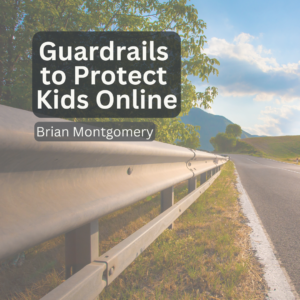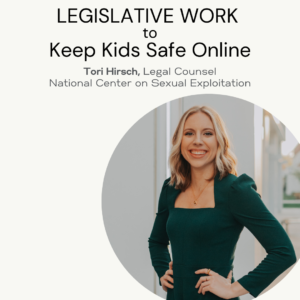0:00:02 – Speaker 1
Welcome to the nextTalk podcast, where we share real stories and practical advice for parenting the digital world.
0:00:09 – Speaker 2
We’re your hosts, Mandy and Kim. Mandy is an award-winning author and the founder of nextTalk, and I’m the director of nextTalk, a nonprofit organization created to strengthen families through open communication. You can check out all of our resources at nextTalk.org.
0:00:24 – Speaker 1
We’re your wives, moms and friends, tackling culturally relevant topics from a Christian perspective. We’re sharing what we’ve learned and where we’ve failed. We’re so glad you’re here for this conversation. Hello guys, this is Mandy and Kim here, and we have a very special guest with us today. His name is Brian Montgomery. Welcome to the show, brian.
0:00:46 – Speaker 3
Thanks guys, Appreciate you all having me.
0:00:48 – Speaker 1
Brian, a couple months ago I was at an event and one of our team members sent me a story from Fox News and I didn’t have time to watch it right away. And I got home from the event and I watched it and Brian was on there and he was talking about his son, who he recently lost to suicide because of sex torsion, and it was a lot of things that I hadn’t seen before, a couple points that were new in this online manipulation grooming space that we’ve been working in, and so I knew immediately I wanted to have Brian on the show, and I just want to say, first of all, he’s a dad and he’s mourning and he’s taking time away from his family to be with us today. So you are courageous, brian, and I thank you so much for being willing to share Walker’s story with us.
0:01:43 – Speaker 3
Well, you’re welcome, our family’s in your right At this point. It’s a start and stop process, just to be honest, but we understand the need that Walker’s life, our life. God has specifically chosen us to tell a story and it’s unfortunately our story, but we believe it’s important, so that’s why we’re here.
0:02:10 – Speaker 1
So, brian, start from the beginning. Tell us about your family.
0:02:14 – Speaker 3
Yeah, I would say that Courtney and I my watch name is Courtney we met in high school. High school Sweethearts Met senior year of high school. I had moved schools to her school. We grew up in the same hometown, greenville, mississippi, where we both grew up, and we dated for five years, got married, took a little while, started having kids, and just kind of your typical young couple. Neither one of us came from affluent families. I mean, both of us had three deep, but it wasn’t, you know, we definitely weren’t raised in a wealthy home either one of us. I went to public school in Greenville until my senior year, which time I transferred to a Christian school, which is where I met Courtney.
Our lives were, just to be honest, up until this event, were truly fairy tale lives. I mean, we love the Lord. We were involved in our church. Have all these taken our kids to church, have always prayed with our kids, have always talked about Christ with our kids? Our youngest daughter was baptized here just a few weeks ago. All of our children come to know, have come to know the Lord Jesus. And so I mean I would say and that’s from a spiritual perspective, from a, you know, just a secular perspective I mean we’ve grown a successful business through with some partners and just had a fantastic life, been able to do things and see things that most people with our upbringing would not have had the opportunity to do. So God just continually, just just blessed, you know, the work of our hands and our time together. And we were a long ways from we are still a long way from perfect parents, but we felt like we were above the par line, for sure, and and trying to trying to make those efforts to be good parents and so, yeah, so we started our business here in Starkville, which is where we live now, live out on a, on a farm in a rural area.
Our kids go to a private school in Starkville, starkville Academy. You know our kids are normal kids. I mean I can talk a little bit. Walker, you know Walker’s only trouble Walker ever had in school was, you know, was superficial stuff like every kid, you know. I mean it was always an honor to hear from Walker’s teachers because they were always bragging about how much they love Walker and that was kind of kiddy was, you know.
And and our life and our lifestyle, we, I mean we strive for that, We’ve worked really hard for that and I think that’s a you know, in all of this, that’s the one of the most difficult things is you start to? I mean, obviously there’s tons of questions we’ve had specifically as Christians, as believers, we think about, you know why, us, you know why, walker, and I believe that the things that God wants to use in us are directly related to sometimes what we view as strengths become our weaknesses, and he wants, he wants other people to see that in us and he wants other people to see a message of hope and grace and love and in in the middle of these types of circumstances. Amen.
0:05:28 – Speaker 1
I mean it’s it’s pretty courageous that you’re already seeing. You know how God can use this for good, to help other people. I don’t know that I could be where you are, and so that is showing incredible faith on your part. So, walker, tell us how old he is and how many kids do you have? You have four total right.
0:05:48 – Speaker 3
Yep, so we have four kids. We have, I mean, that’s another, I guess just a you know for our lives how perfect it was, you know with. And I say was I don’t want to discredit, I mean, I think we I told Courtney that pretty soon after this, as you know, as good as our lives were, our lives are still that good I mean without Walker here is temporary and we understand that. But yeah, so our kids, two boys and two girls. My oldest daughter is Caroline. She’s 18, walker was 16, bennett, his younger brother, was 13, and Sarah, the youngest, our youngest daughter, is 11. It’s hard to imagine, because we lived a life. I just it was like I said, it was just a fairytale life. I mean, God continually just blessed everything that we touched. And I’m not saying he’s through blessing us, I’m not, I’m not making that assumption. I’m just saying that this is a different kind of trial, that we never anticipated and our lives didn’t reflect that, that this type of issue could ever landed our doorsteps.
0:06:49 – Speaker 2
I think that’s probably for most parents, for all of us. We think that that couldn’t happen to us. You know, even if things aren’t going great especially you know Christian household mom and dad is there, we’re doing our best, we’re talking about things. We think that that’s not going to happen in our household. We’re a good family. That happens to those people or, you know, on the other side of the tracks, and I think part of your message is reminding parents that this type of evil and this type of circumstance can happen to any of us.
0:07:25 – Speaker 3
Yeah, I’d like to speak a little more to that. I think that this particular trap and this so I’m spending quite a bit of time now speaking to high schools and church youth groups and stuff like that and I use a trap we trap. We’re heavily involved in the outdoors and we farm, we have hunting land, we have fish, we have fish pond, we have I mean, we have all kinds of things we’re doing the outdoors. Walker’s big affinity was for football. He loved football. He was a great outdoorsman. Also, some of the pictures I sent you guys or have him you know with. He and I spent a lot of time out, a lot of time together outdoors hunting turkeys, antelope, deer, you name it. We hunted a lot.
I think that people think this particular trap, as I refer to it, as in a lot of those conversations, kids that have it all together are the kids that are most susceptible and the people that are predators in this sector and we use that kind of as a business term, but in this sector, because it has become a business for these people they’re professionals that seeking out the people that are most susceptible, and that’s what a predator does, right he identifies who’s the weakest, who’s the most susceptible to his trap and that’s who he finds, and they’ve become professionals at figuring this out through social media presence, and I would just say that I mean this is the trap that we’re talking about today. There are tons of traps related to technology that we can discuss, but this particular one we believe that it is kids like Walker are most susceptible, which is very unfair, because you take a kid that is a really good kid and I tell people you know I’m his dad. So I think it really comes across as biased. It obviously does come across as biased, but if you could have known Walker, if you could have spent some time around Walker, you would understand how little sense this makes. I mean, I use the comparison. I say you know, if today’s a sunny day in Mississippi, and I would have told you before this that the odds of me getting struck by lightning on a sunny day, were it was, that was a higher probability than Walker doing Walker taking his own life, and I say that as a metaphor. But I really believe that if you did the probability statistics on this being that occurrence, that’s true. It’s absolutely true that, walker, there is no life that you could imagine where Walker would have done this, and so it goes to the heart of how big of a stress it is to a kid like Walker.
And I’m saying that not to say that Walker is better than anybody. I’m saying that to say that everybody has a weakness, and especially for Christians, our families, sometimes our weakness is our goodness. It’s hard for us to accept, it’s hard for us to understand, because it’s not understandable, right? I mean, that’s not something that we just walk around with, think I’m gonna be strong and therefore that strength is gonna become my weakness. But in this case it’s exactly what happened, and so awareness is absolutely key, awareness of multiple things, just of the traps that are out there. That’s more of I look at that kind of a secular perspective of avoiding the traps, but from a spiritual perspective is really and truly gardener hearts from the things this world has that start very small and end up in a place where Walker found himself.
0:10:54 – Speaker 1
Well, and I think this is so important, and, if we can, I want to dive into some details of what actually happened, because I think that’s where we can really raise some awareness on these traps that were set for Walker. Your spot on with what you said is is that the kids who are good, high achieving you know, we’ve got a, you’ve got a young athlete here that all his teachers like him these kids are more susceptible because it’s an image thing and it is a like oh my gosh, what did I just do? You know we say this all the time. These good kids, they make mistakes because this online world, there’s so many clickbait and go here, go there, who to trust, who not to trust. And it’s so important that we get out his story so that parents can understand exactly how he was manipulated. So, first of all, somebody made contact with him on social media, correct? And can you kind of tell us that? Because there was something in this part of the story that drew my attention a little bit.
0:11:58 – Speaker 3
Yeah, I’ll just tell you the story, kind of from beginning to end. I mean, you know our, obviously, we, you know the next one we found Walker in our lives, completely turned upside down. We had no understanding and there was nothing that made sense. So what happened is, around midnight on December 1st, somebody messaged Walker through Instagram. There’s a messaging portion of Instagram. Okay, so that that message and that and that functions, that, can that, that that messaging portal is a lot. I mean, there’s a lot of features in there that I didn’t, I wasn’t aware of, you know, disappearing messages and things, all those things that you know that that, as a parent, you know, really causes you a lot of anxiety, but anyway.
So they messaged Walker pretending to be a young girl and it was very casual. Hey, what’s up? You know, and I’m sure Walker clicked on their profile. So I was an attractive 16, 17 year old girl and he says nothing, just hanging out. This was about midnight and he, they just started a casual conversation back and forth hey, where do you go to school? Hey, what do you like? You see you playing football, just normal teenage stuff, right.
At some point that conversation this person says hey, do you want to fool around Walker. I says, well, what do you mean, you know? And she says, well, you know, can’t fool around through the video app here and I’m not exactly sure the terminology she used, but basically convinced him to open a, a live chat through that messaging portal. It’s very similar to what would be a FaceTime video, right? So that proceeds into a sexual encounter, and all the time, walker didn’t know it, they were videoing him with a secondary device on the other side of that.
So when we talk about this, I want to describe this a little bit, and I don’t want to. I don’t want to go too far out in deep water here, but this, this is sex. Distortion is often described as just a picture, right? Well, they sent nude pictures and, yeah, that happens and that’s a problem, no doubt. But what I want to describe here is is that’s not what happened to Walker. What happened to Walker is they had a video of him and I’m going to leave it up to your imagination what he was doing, but it was not something that he would have wanted anybody in the on the planet to see. And so, as adults, I think it’s important, as adults and kids, for us to consider our own lives, and our own sex life specifically, and imagine ourselves in that situation. And I mean we’re all, as adults, we need to start recognizing reality, for we’ve all been in situations that were not very attractive and you would not want anybody else to see.
Okay, and Walker found himself in that situation at 16 years old, as a young man. Now, what do I do? Cause? Directly after that sexual encounter, they closed the video chat and these this person immediately comes back wanting money, ask for a thousand dollars. Walker, I can only imagine um, panicked, he had no idea what to do.
This went on for a couple of hours about two hours is how long this conversation went back and forth and these people were different than normal, because what normally would happen is they would try to string this along until they got money. Okay, um, whereas this was different is they asked for money? Walker said no, I don’t have any money. They go back and forth about the money. Walker’s begging them to stop begging them to leave him alone. Please stop. He actually tries to call again through that video chat. They said stop calling, we need the money. You got to get the money. Walker says I don’t have the money. You don’t understand. We live in the middle of nowhere. Uh, we live on a farm. I’m 15 years old he was actually 16th time, but I’m 15 years old, you know, they saw it from your mom and daddy. Uh, walker says I can’t do that and they’re just going back and forth.
So it appears to me like within an hour of the you know the extortion portion of these messages, uh, they start sending Walker what would be screenshots of them, with this video attached in a met, in the message, in their messaging side, you know, indicating they’re sending the messages out to people in his contact list. So they start sending him these, these screenshots, basically showing him that they’re sending the messages out, trying to build that pressure. So they’re building this mountain of pressure in front of Walker and all the time they’re telling them if you don’t pay us, your life is over, your life is done, you’ll never be anything, everything you love is gone. I mean just really apply an extreme pressure to Walker at that. At that point and what I mean by this is different is is it’s not different that they put pressure, it’s different that they start so fast.
So it wasn’t spread out over a couple of days, through three days, where you know a parent where we would have the opportunity and daylight. You know, once you get to daylight and you see stress, obviously as your kid, you, you expect you would see that stress. And after now being engaged with this process for you know, I don’t know the last six weeks talking to other parents that happens a lot where the kid is trying to figure out how to deal with it. He don’t know what to do, he don’t know how to get the money, he don’t know to pay or not to pay. He goes and spends money. He don’t have any more money. Well, that stress pops up. Right, if you can observe the kids, that stress becomes apparent and as a parent, if you’re paying attention, you can spot that spot. Something’s wrong. I mean, I know what, but you can spot something’s wrong.
We didn’t have that opportunity because throughout the night, within that two hours, they kept applying pressure, kept applying pressure and finally it looks like they’re just going down his contact list alphabetically out of Instagram and they get to his mother’s. Mother’s name is Courtney, let’s see. And so they show another of those videos where they send it to Courtney, his mom, and Walker just replies to him, says well, I’m going to kill myself, and they said go ahead, you’re already dead anyway and it’s. You know, you can’t assume anything other than number one. They didn’t care that he killed himself. They said that number two they it’s almost as though they wanted him to do that If they couldn’t have the money, they wanted him to kill himself.
And that’s what the FBI also believes is that there was an intentional, you know, pressure to Walker. And so at that point, at some time during the night, walker comes out of his bedroom and comes downstairs into my office, which is where I’m at today, but comes into my office where I have a safe and he knows the code to my safe because we I mean we hunt, we’re outside outdoors all the time and gets a handgun out of my safe and goes back up to his room and at some point during the night he takes us on life. And so you know it’s so hard to understand these people how it can mean life can mean so little to them. It’s $4,000. You know, and you take somebody the age of Walker that, to back to our original point that how they’re seen in society is so important, how they’re viewed by their friends, by their teachers, by their parents. It’s kids like Walker are going to be the ones that are the most susceptible to this type of crime.
0:19:34 – Speaker 1
Thank you for sharing all of that. So one of the things that just I’ve never seen before and we’ve been in this online grooming space for a while is the like. You said that this happened in the course of one evening, correct?
0:19:50 – Speaker 3
Correct. Yeah, there was no other contact before this and we know this. So I mean, obviously, when we find Walker and start walking down this road, you can only imagine the questions that I mean just don’t even know where to look or talk or don’t even know in the beginning. But once the FBI, I mean we knew something, there was something going on. We didn’t know about because the day before Walker was as normal and that was what everybody said, all of his friends. We immediately went to his friends and said hey, did y’all see anything? Hear anything anything? No, walker was exactly like he always was. He was laughing, he was smiling, having a great time in the weight room at school. The day before we had supper that night my wife prayed with him, put him to bed. I mean, it was a normal night. And so obviously we knew that something had gone south at some point and something was going on with Walker. We didn’t know about, we had no idea what, but I was confident that we would figure that out through his phone.
And once the FBI got his phone and got everything downloaded and they’ve got software to retrieve everything that was deleted, everything that was there and everything was just exactly what we expected. I mean Walker was a 16 year old boy that talked about football, hunting and friends. I mean there was nothing out of line in Walker’s phone. I mean, everything was exactly what you would have could have anticipated a 16 year old boy was no depression, and that’s a real important thing. I think that anytime we talk about suicide as automatically navigates to a mental health issue, and I guess in the heart of it there is probably. But when you get to the reality of Walker, we had no. I mean, there was nothing. It was a reaction to a stimulus, which is completely different from somebody being depressed over a long period of time with having issues, having mental issues. Walker had none of that and I’m not trying to position him as he was better than somebody else that does. I’m saying that it goes to the intensity of this threat to a 16 year old boy.
0:21:57 – Speaker 1
I can just only imagine the panic Like I’m thinking. If this would have happened to me and I’m a grown woman, you know, with my brain fully developed and not as many hormones going on Like I can only imagine what I would have felt. And you put that on a kid. Like you said, the level of intensity, I think, is something we can’t really imagine because we didn’t grow up digital. We don’t know what this is like to be blackmailed in this way.
That really stood out to me as far as it happened in the course of one evening and you didn’t get the chance to see mood changes. You didn’t get the chance to maybe him panic and say something’s not right, help me here. You didn’t get that opportunity and I think parents really need to understand how fast something like this can happen. His friends were saying he was laughing the day before you saw no red flags and the next day he’s gone because of something evil that came through his Instagram. And I think that’s just so important for parents to hear that part of the story, because it’s not the standard sex torsion cases that we’re seeing.
0:23:10 – Speaker 3
No, it’s not, but I think that you know what I’m really trying to. I mean, this is the trap of the day. You know, you get fast forward 12 months and this will probably not be the thing that the bad guys are using. It’s the thing that we need to spread awareness as fast as possible today. But I mean, I had a message yesterday from a person on Facebook that their son she had talked to her son within the last few weeks about Walker’s situation Actually sent him the video of the Fox News interview, and she has two sons and she said both of them kind of blew it off, it’ll never happen to me. Well, this weekend it happened to her younger, 17 year old son and now he’s you know, he’s having to deal with a social issue, fortunately, and she said that she attributed to his ability, her ability to get to him because of he already knew that this was a trap, knew he had stepped in the trap and knew that he was in trouble and knew where it led Walker and he had to get some help. And so you know, from the context of what our, our lives are meaning to other people, I think that’s happening regularly.
We, a lot of them we don’t hear about it. Look, I don’t need to hear about them. I know God’s got a plan in this and I know he’s at work, but my point in that is is that Walker what I would say is Walker didn’t just. This is not how Satan works, and this is the spiritual side of this that I think as Christians. A world that’s not a Christian may not want to admit this, but we’re at war, in a spiritual war, with Satan. If you believe there’s a God, you cannot believe that there’s not a Satan. The Bible speaks to it clearly, and so you can’t believe. I believe there’s a God, I believe that God’s out there and Jesus is just Son. I believe all that, but there’s no such thing as a devil. Well, you’re not reading the same Bible I’m reading, okay? So if we don’t want to acknowledge that that is real.
And so what’s happening and I go back to my trapping analogy is we trap hogs, that’s the wild hogs. They’re very damaging to the environment and they’re land and they can overpopulate really fast. They’re not a native species, so we have a trap for them, but what we do is we bait them with corn and that’s a free meal to a hog, right? Well, that free meal is very enticing and it starts with them being very cautious to come into that trap. But over time they get conditioned to freely go in and out of that trap and they don’t understand there’s a danger there. They just understand at some point. I’ve been in and out a year a dozen times and I haven’t been caught, so it must be safe.
Well, similarly, I believe, especially our teenage boys. We’re letting them dabble in pornography, whether it’s just through observations in social media or true looking at pornography. The only thing out of the way on Walker’s telephone is he’s a 16 year old boy and he was looking at pornography. And as his dad, if I have a failure, that is my failure. I should not have allowed him to have that phone in private spaces where he had the opportunity to do that. I should have had a better line of communication with my son about the dangers.
Well, I didn’t understand the dangers because whenever I was 16, the danger was I’d have a warped perception of a sexual relationship. That’s not good, obviously, but it doesn’t lead to this. So If I would be talking to a dad, I’d say you know what? The days of us looking at a dirty magazine and having some mental problems because of it. That’s not what we’re talking about here.
It leads to some places. This trap this day leads to some places that are not recoverable, and that’s what happened to Walker. So I believe that Walker saw this as an extension of some light pornography use and he didn’t recognize it as that conditioning that this world is laying in front of these boys, especially as and I’m not saying there’s obviously tons of traps in there for the young girls as well, but for our boys specifically once Walker stepped in the middle of this trap as hard as he did, I mean, he gave them everything, he gave them the worst case scenario to use against him, and he didn’t know it. He had no idea, and I didn’t have any idea to educate him.
0:27:15 – Speaker 1
You know, first, peter 5.8 says Satan prowls around like a lion waiting to pounce, and I always say at my events I’m going to add, on our children. He’s out there praying on our kids and you are 100% correct in the pornography space, it is sexualizing our kids in a way that it lets them have their guard down on things. You know we have cameras in locker rooms now and so just taking snaps of everybody’s parts as normalized, and all of that makes our guard down. Satan knows that. When I watched the Fox News clip to Brian, I want to tell you I have a 15 year old athlete in my home son and I watched it the night I got home. At the event, he was already in bed the next day on the way to school. We had a conversation about Walker, your son. He’s already saving lives like this mom that contacted you. You know the conversations that it’s created in my home and I just want to reassure you. Like your courage to get on here and share it matters, like it matters.
0:28:27 – Speaker 3
Well, we, I mean we believe that. I believe that I believe that it’s there’s days I mean I guess you get I mean I was thinking about it this morning you know there’s whenever you go through any kind of. I mean, if all of a sudden, one day, you know, my business fails, I’ve got to figure out why. And you know that’s as a dad and as parents, my wife and I, you know why are we in this situation? And sometimes you have to just look to God and say God, I have to believe and have faith that you have a plan and that your plan involves this. It’s not this happened to happen, that you because God let’s be honest, god could have prevented this. He could have prevented it. I’m not. I mean, if he’s able to, if he’s able to save me from my sins for eternity, he’s able to stop Walker from walking down those stairs.
On one hand, there’s times where that makes you really angry with God, because you’re asking us to walk down a road that seems impossible. On another hand, god’s chosen us for this message and so, as hard as it is, it would be harder to think that this tragedy and this much pain goes unused, because I mean the pain that exists and that’s, you know, the pain that this is inflicted on our family is, it’s not measurable. I mean, it’s not something that you can. There’s never a point in time where it’s not in your mind. There’s never that point. And so trying to figure out a way to honor God with this is it’s my goal and it’s my wife’s goal, and it won’t be that long. We’ll see Walker again.
0:30:17 – Speaker 2
I have to tell you you are incredibly brave and I’m so thankful for you sharing your story. And, much like Mandy, I have a 13 year old boy who’s also an athlete, and the day after I received the story, I shared the story with him and he too was surprised. But he said something and I’ve been mulling over it and wanting to ask you. He said well, Mom, what do I, what should I tell my friends, how can we help each other? And I thought about that. That it’s. You know, it’s not just changing the tide with parents, you know us needing to parent differently, but also kids helping each other, to make it not so shameful to say I’m struggling with this or I did this bad thing, Because then that takes the pressure down. And so I guess that would be my question to you what would you want parents to know and kids to know, based on what you’ve experienced with Walker?
0:31:19 – Speaker 3
Yeah.
So, from the kids perspective, what I’m really trying to promote with the kids in terms of so Walker’s response and how he decided the way to go for this was was in response to how he thought we would react, and when I say we, I mean everybody around who was the most pressure? You know who in his mind, somebody that he could envision, when they saw that video, how they would react. He had some people in mind, right His mom and daddy, his friends, the girls at school. What was it that pushed him? There were some, there were some pressure point in there, right, that pushed him that whenever this person, whenever these people see this, they’re going to react this way and I can’t face that, okay. So what I want to encourage the kids to do is acknowledge one another’s mistakes and love on them, love on each other. This life is too short to hate on each other, and it happened. I mean, and look, that’s asking a lot out of out of teenagers. I know they. They don’t have the awareness of, of this concept of empathy, and I can see myself in that position. They struggle with that, obviously, as because that’s why teenagers are so tough on each other, right, I mean, they can be best friends today and enemies tomorrow, and and we don’t want that as adults, we want them to see life like we see life, which is that we’ve experienced a lot of failures. And what if everybody had been that way to us? Well, we can kind of step across the fence a little bit. But the reality of Walker’s response it was. It was because of how he thought that we would react. And so I, I I speak to the kids this way. I say look, I mean look to your right and left and think about when that person makes a mistake. Don’t be the person that is against them. Be the person that puts your arm around and say hey, I still love you made a mistake, but I still love you. That reaction, all of a sudden, whenever they’re in the middle of that struggle, I think I can. They can envision somebody saying it’s not going to be as bad as you think it is.
And, from a parental point of view, where are all the threats to our kids? You know that I mean that, says a parent. That’s what we try to do. We try to figure out, okay, what are the most threatening things to our kids. So we automatically and we prove this out by our actions. We are most threatening thing to our kids is them not having a good job. That’s what we think about. They don’t have a good job, so we press get a good education, make straight A’s, make high on ACT, go to a good college, pick a good curriculum, go to you know, get a big job and make a bunch of money and you’ll be happy. That’s not the biggest threat to our kids, and I say that because that is quite obviously where our actions show that we were most concerned about, because that’s what we spend the most time and money and effort coaching them. Our effort is a mandate of what we believe, and so I would think through and I’m trying to do this myself is think through. What are the real threats? What do I? What’s really going to? I’m going to be able to look in the mirror when I’m 70 and say I really screwed that deal up. Well, it’s going to be kids without character and without love and without Christ. That would be the thing that would. That would.
And Walker was a Christian. Walker was baptized. Walker never said one prayer. He prayed every day. We prayed for our supper, we prayed together and Walker’s prayer was always ended by thank you, god, for sending your son to dial across for our sins every single time. That was his prayer. Walker was a Christian, 100%. He’s in heaven right now, right now.
But practically we’ve got to boil that down to some things that that we have to protect our kids from today. And I spoke to our state Senate last week and you know I use the analogy of alcohol. So at some point in this country we agree that 21 years of age was a minimum age to drink alcohol. We passed a federal law in the 80s to mandate that throughout every state in this country. Why would we do that? We came to a recognition that there was this alcohol that was not good for kids under 21. Well, we came to that conclusion as a group of people. It was. Is it perfectly enforced? No, it’s not perfectly enforced, but at a minimum it gives parents. Whenever I catch my 16 year old drinking alcohol at a minimum gives me a lot of point to say look, even our federal government agrees that this is not good for you. So it brings some consensus among parents.
And so, as parents, we’ve crossed the technology bridge that’s there’s. Technology is not a threat to. Now we realize technology is a threat. We’re learning that, the depression, that the suicide rates, that the you know I think about. This is kind of a topic I don’t hear discussed very much.
But you know, when, probably our generation the biggest threat to teenagers was teen pregnancy Don’t have sex before you’re married, right, especially as Christians, we preached that and we’re preached to that, and you know that was a. That was the major conversation. Well, now we’re finding that teen sex. We’ve achieved most of that. That teen sex is on the decline.
Well, ask ourselves, why is that? Boys’ hormones are exactly the same, girls’ hormones are exactly the same. What’s changed? Well, the answer to that is that the boys are getting what they need sexually from a telephone. That’s the answer, and so are we good with that. Is that? What is that doing? What is that doing for our future kids, whenever they’re? I mean, there’s a lot of dynamics that go on whenever a young man is trying to find a mate at 16 years old. Is it good? No, it’s not good, but it’s a natural tendency for these boys to seek girls and to seek out things that are gonna make them more attractive. What do you? Why do we think boys are so attractive? To athletics, to career, to all the things that make them look good to girls Well, when they don’t have to seek that because they’re receiving all they need through a telephone.
We’ve got all kinds of problems that are on the horizon. We’ve not even talking about AI and the potential for how that looks in five, 10 years. So my point in that is is that, back to the comparison to alcohol, we have gotta take this seriously as parents, but at the same time, we know that technology is not going away. It’s gonna be here. And so how do we navigate this world? We’re in safely for our kids and if we as parents don’t stop just passing the bug, saying it’s not a big deal, brian’s just being overprotected because he lost his son. He don’t understand. This is. The kids will be fine. That is not the case. Our culture is about to shift and it’s gonna shift in a drastic way, and we’re not gonna be happy with the outcome.
0:38:00 – Speaker 1
Well, and we haven’t even begun to talk about the long-term effects on marriages and relationships that this culture is having With being sexually satisfied by yourself behind a screen. We haven’t even begun to talk about future relationships. But right now, you’re right, it’s just like navigating the here and now and getting our kids to understand why this is not okay, why this is not God’s design for sex or intimacy or anything. But we’re dealing with this over sexualized, tech-driven culture and that’s why we are so passionate about these conversations that we’re to have with our kids, to kind of educate them. I wanna encourage any parent listening with a teenage son who has a phone that they will have their teenage son listen to this podcast and then you all talk about it together. I think this would be very, very important to start a dialogue in your home right now about what’s happening in young men’s lives in our world today. Is there anything else that you wanna tell our parents as we sign off today?
0:39:12 – Speaker 3
Yeah, I think that what I’m interested in right now, I think from a practical perspective, is obviously in the home. Today it’s circle the wagons and let’s figure out how to keep some of these things out of our kids phone. The answer is not take them away, it’s not gonna work. We’ve got too many things that hang on the technology, from school assignments to appointments to everything else that go through there. But what I? We’re not gonna see a change until public opinion comes to a consensus, and we’re seeing that a little bit.
Utah just passed a bill that I think is a good start, limiting social media age requirements, allowing parents to have to authorize them to be on social media, and I wanna encourage our parents to understand that this culture we’re living in today is wanting to separate parents from kids. Well, ask yourself, why is that? Why do they wanna separate parents from kids? Cause what the defenders of that I mean, what the opponents of that law are saying is that kids have a constitutional right for protections of privacy, and that is not. That doesn’t include their parents. In other words, a kid has some constitutional legal right to operate with some privacy outside of their parents rule. That is not what my Bible says, and that is not how I’m gonna operate. And so my point is that until we, as parents, come to a consensus that that’s not how we’re gonna do this, though, our parents, our kids are gonna be supervised by us and we need some legal parental protections in this world of technology and we need our government to come alongside us with that, and we need tech companies to acknowledge that, and obviously that’s a critical part of their income.
Let’s just be honest. It’s driven by the financials of these companies, and so I would say that you know, from a real practical point of view, is continue to sound the alarm at our state levels of the need for regulations with tech companies, and section 230 is a disaster that’s preventing any litigation, which I’m not about litigating, but in I mean a general business. They spend money in two areas in protections from litigations and investment in future products. Well, tech companies have the advantage they only have to invest in future products. They have no problems with litigation because they’re protected against them, and so, whenever they can prevent that IP address from Nigeria to access my 16 year old’s phone, they don’t because they don’t have to. So I would encourage parents to continue that fight and continue to voice their opinions to their local state legislatures. And you know we’ve got to be together on this and I just appreciate you guys having me. Let me ran on a little bit.
0:41:59 – Speaker 2
No, we really, really, truly appreciate you being so transparent with us today.
You know, thinking about everything that you said today, there is the legal side of it that we can push into.
And then today, this very day when our kids come home from school, we can look them in the eyes and say there is nothing you can do that would make you be separated from me, that I would be ashamed of you or upset with you in a way that would change my love for you, and I think that’s the summary of your whole story that our kids need to know they can’t do anything that would make us love them any less, and that, as parents, we really, really truly need to know what our kids are up against, the culture they’re facing, the threats against them, the reality of their day today, and be in their world, know what’s going on. Don’t put your head in the sand. We cannot do that, and if you are someone who will fight against the laws, please do so because you’re right. We can fight this from all angles, but it starts in our homes with our kids, and you’ve done a beautiful job today and sharing that with us, and we’re so very thankful for you being on our show.
0:43:13 – Speaker 3
Thank you for that. I would say, make one more comment to that. What you said about you know having that conversation with our kids, you know, I think that sometimes we, when I tell my kids, hey, there’s nothing you can do, that will change how I feel about you or how I see you or how I love you. I don’t really believe Walker made that decision based on how he thought our family would view him. I think he made that decision based on how he thought his peers would view him, and I think that’s probably the book of it, right? So what I would incur, what I think is so, what I say a lot, is that the power of the sin is in the secret, which is why I’m talking about this.
This is not, I mean, look, this is not something that I mean. We’re making Walker’s worst nightmare come true, telling everybody he looked at pornography and entered into a sexual relationship with somebody over Instagram. Right, the whole world knows that about Walker now. So his worst fear is being realized without him here, and I want to. I want the secret is where that power lives. Is it keeping it a secret? And so my point is is that whenever I see the statistic that 87% of men have looked at pornography within the last year and 47% of them look at it on a regular basis. Okay, so those boys you’re worried about how they see you. 87 out of a hundred of them have done this, have done something very similar within the last year, and half of them do it regularly. And when I say that in front of a group of men, everybody looks to their left and right. Well, that’s some of you.
0:44:40 – Speaker 1
It’s so good? Absolutely, it’s some of you. We’ve got to get our head out of the sand. We’ve literally got to get our head out of the sand, all of us. And admit I love what you said, that the the secret is the sin is the secret. How did you say that?
0:44:54 – Speaker 3
again, it was so good. The power of the sin is in the secret. It is. It’s it’s.
0:45:00 – Speaker 1
We’re always saying bring it into the light. We got to bring it into the light because that, that way, satan doesn’t have power over it anymore.
0:45:07 – Speaker 3
And I would just tell parents look, does not be Spud, not be naive to what this world is doing and what. And it mean I can look back to my childhood and my life and see the Things that I’ve done. What if those things were on video? Who am I to judge somebody else for how they’ve the mistakes they’ve made? I’m nobody, I’m just a. I’m just a guy, just like everybody else is, and I Just wish I could go back and have that conversation with Walker, but I can’t. But I can tell you and hopefully other parents and kids will hear that and say I can relate to that, I understand you know, I just want to end by saying you know to you and court me, this whole technology thing.
0:45:47 – Speaker 1
It’s blindsided. All of us, we’ve all missed things. We’ve all, we’ve all missed things. You know, this is a kid and he had a hormonal reaction and I think any of us can hear your story and think that could be my kid. No matter how much I tell him I love him, no matter how much I tell him I’m gonna, this could be my, because they’re impulsive and they’re hormonal and they’re kids and this is way above what they need to be dealing with in their little 16 year old brains.
0:46:19 – Speaker 3
We can’t over protect, but there’s minutes. Like I said last week with the Senate, I said we wouldn’t tell a 16 year old, we wouldn’t leave them with a bottle of whiskey and say, just be responsible. They don’t. We’re not. We’re not accounting for the addictive nature Of this technology. We’re not accounting for the power it has. We’re not accounting for all the mental things it brings into play, that we’re pretending like it’s just, we’ll just take it away. We’ll just take, just take their phone away.
0:46:44 – Speaker 1
Well, and in our situation when we, when parents take their phones away, they just go to go to school and use a friend’s phone, and we’ve often seen that in sex torsion cases, like they will, they will talk with the stranger online from a friend’s phone, so their parents can’t monitor it, even with parents who are really in there monitoring everything. And so it is evil. It is Satan who comes to still kill and destroy our kids, and that’s what we’re up against. We are in a battle to save our children’s lives, literally, literally. Again, I, just I thank you.
Walker’s story is, you know, the two main things that really stuck out at me and you you said this on the show was was the Timeline, like how fast it happened, and also the video. We’ve dealt with a lot of, like you said, nude photos being exchanged, but the video is a whole new level of a way to manipulate the person that’s being groomed and and, and we can all imagine how we would feel, caught at our most vulnerable spot, and then you place it on a 16 year old kid, like my heart just breaks. And so Hear us that we’re gonna keep sharing your story and we’re gonna try and get this out to the masses, because this is I feel like this is one of the most important shows we’ve ever done. Quite honestly, any of our kids can fall prey to this, and so my prayer and my hope is is that, parents of teenage boys, you will listen to this show and you will develop some good conversations from it in your home.
0:48:12 – Speaker 3
That’s what we hope. Thank y’all.
0:48:13 – Speaker 1
Thank you so much for joining us, listening and sharing our podcast.
0:48:18 – Speaker 2
Because of you, this show is in the top 5% of over 2.9 million Podcasts we have lots of resources for you, from counseling to live events, or if you have a show, idea or question for our team, visit our website at nextTalk org. We’d love to hear from you at nextTalk.
0:48:38 – Speaker 1
We’re more than cyber parenting. It’s conversations to connect.
0:48:42 – Speaker 3
This podcast is not intended to replace the advice of a trained healthcare or legal professional, or to diagnose, treat or otherwise render expert advice regarding any type of medical, psychological or legal problem. Listeners are advised to consult a qualified expert for.
Transcribed by https://podium.page
















